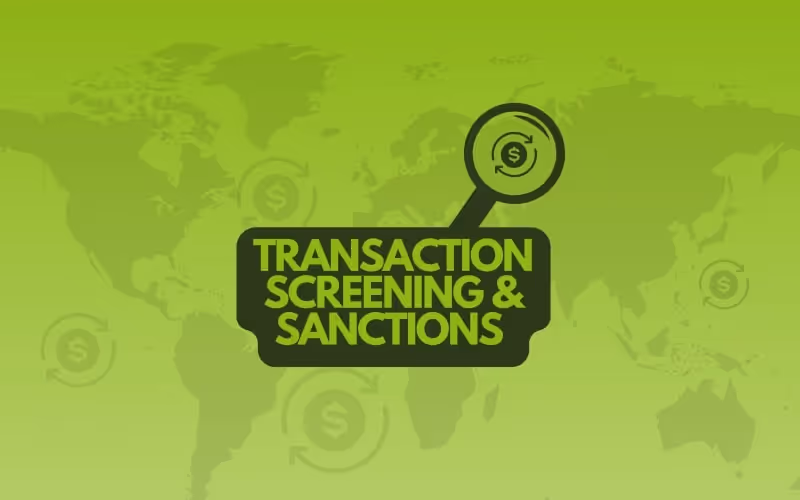
Mastering Transaction Screening for Sanctions Compliance
The global sanctions landscape is highly complex, ever-changing, and challenging for even the most resourced compliance teams. Thousands of individuals and entities appear on international sanctions lists that are updated daily. Effective transaction screening is, of course, critical in identifying and preventing potential sanctions violations. In this sanctions.io guide, we reveal how to do it right - and, ultimately, reduce the risk of non-compliance for your business.
Transaction screening is a vital line of defense in protecting your organisation from exposure to sanctions violations, money laundering, terrorist financing, and financial fraud. As sanctions regimes expand and enforcement intensifies globally, financial institutions, fintech companies, insurers, and trade entities must implement screening that is real-time, reliable, and responsive.
Before diving into how sanctions.io supports this process, let’s take a closer look at what transaction screening involves and how it supports broader anti-money laundering (AML) and counter-terrorist financing (CTF) objectives.
What Is Transaction Screening?
Transaction screening is a key activity within the broader scope of transaction monitoring. While monitoring focuses on detecting suspicious activity over time, screening happens at the point of transaction—evaluating payment data in real time against regulatory and internal risk parameters.
Whenever money moves—whether digitally or physically—through deposits, withdrawals, wire transfers, or cross-border payments, the risk of criminal exploitation exists. Criminal networks exploit speed and system fragmentation to launder funds, finance illegal activities, or evade international sanctions.
That’s why authorities like the U.S. Office of Foreign Assets Control (OFAC), the UK’s Office of Financial Sanctions Implementation (OFSI), and the European Commission require regulated entities to actively screen and block transactions involving sanctioned individuals, entities, countries, or vessels.
Through effective transaction screening, companies can:
- Detect and block interactions with sanctioned parties
- Identify links to terrorist financing or criminal networks
- Prevent fraud, corruption, or money laundering
- Avoid enforcement action and reputational damage
Transaction Screening and Sanctions Compliance
Sanctions compliance depends on event-driven, real-time screening of customer transaction data against:
- Global sanctions lists (OFAC, EU, UN, UK, etc.)
- Politically Exposed Persons (PEP) databases
- Adverse media or watchlists
- Known aliases and ownership structures
Solutions like sanctions.io enable organisations to integrate API-based transaction screening into their systems—triggering checks automatically as transactions occur. This ensures minimal friction and full auditability, even in fast-paced, high-volume environments.
To learn more, explore:
👉 What is a Sanctions List?
👉 How Transaction Screening Works with sanctions.io
Tip 1: Data Quality Is Critical to Screening Effectiveness
Sanctions screening is only as effective as the data it evaluates. Even the most advanced screening engines will underperform if the customer or transaction data is incomplete, outdated, or misformatted.
In the wake of the 2022 Russia-Ukraine crisis, sanctions lists have expanded rapidly and changed frequently. Today, ownership data, alias detection, and transliteration accuracy all play a role in effective screening. High-quality data capture from onboarding through transaction processing is non-negotiable.
To avoid false positives, missed matches, and compliance gaps:
- Standardise data entry formats
- Collect comprehensive beneficiary and sender information
- Include identifiers such as address, nationality, and birthdate where possible
- Use automated tools to clean and enrich datasets
For more on reducing false positives, read:
👉 Reducing False Positives in Sanctions Screening
Tip 2: Understand Your Transaction Screening Needs
Every business has unique obligations depending on:
- Jurisdictions of operation
- Products and services offered
- Nature of clients and business partners
- Regulatory expectations for your industry
A one-size-fits-all approach can lead to over-screening (causing customer friction and inefficiency) or under-screening (resulting in legal and financial risk).
To optimise your program:
- Conduct a risk-based assessment tailored to your exposure
- Regularly review and update your screening logic
- Consider implementing real-time screening for high-risk corridors and batch screening for lower-risk flows
- Align your program with FATF, OFAC, and EU guidelines
You can learn more about how to approach screening dynamically in this article:
👉 Sanctions Screening Best Practices
Tip 3: Use Expert Support to Strengthen Screening Strategy
Effective transaction screening demands more than just technology—it requires expertise, agility, and continuous adaptation.
The impact of new sanctions on transaction screening includes:
- Expanding scope of targets and ownership rules
- More complex enforcement with strict liability regimes
- Increased pressure to act immediately and retroactively in some cases
- Additional documentation and audit trail demands
In this environment, in-house compliance teams may struggle to keep up without external support.
Two key support models are emerging:
1. Regulation Technology (RegTech) Providers
Solutions like sanctions.io deliver modern, cloud-based screening tools powered by:
- Real-time sanctions list updates (every 60 minutes)
- AI-enhanced matching and false positive reduction
- Plug-and-play APIs for easy integration into transaction systems
- Global coverage with localised compliance logic
These tools eliminate manual processes, reduce operational burden, and enable scalable compliance programs.
2. Sanctions Risk Advisory Services
Specialised consultants help businesses:
- Build custom risk assessment frameworks
- Design transaction screening logic
- Interpret complex legal frameworks (e.g. EU blocking statutes, secondary sanctions)
Examples of high-risk use cases that benefit from advisory include:
- A fintech platform with cross-border P2P payments
- An investment firm engaging in sanctioned-region securities
- A logistics company transporting dual-use goods to embargoed areas
Always ensure advisory partners are familiar with your sector and jurisdictional exposure.
Final Thoughts: Sanctions Compliance Is a High-Stakes Obligation
Continually improving and perfecting any transaction screening process for sanctions compliance should be a priority for all professionals in the field.
To learn more about how our sanctions, PEP, and criminal watchlist screening service works and to receive answers to all your queries regarding the sanctions.io API, integrations, and more. Book a free Discovery Call now.
7-Day Free Trial (No Credit Card Required)
We offer a free 7-day trial (no credit card is required) and will be delighted to walk you through our service. sanctions.io is a highly reliable and cost-effective solution for sanction checking. AI-powered and with an enterprise-grade API with 99.99% uptime are reasons why customers globally trust us with their sanctions screening needs.



